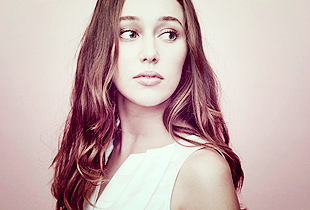Q: Besides sharing a name, have you found any other similarities between you and your character?
A: What I think she’s brought out of me is a street kind of quality. She’s caring and loving, but there’s a toughness to her and she’s resilient. I’d like to think I’m a little bit like that.
Q: What was it like to portray the perspective of a teenager throughout all of this? In addition to homework and college acceptance letters, now you’d have to worry about your prom date wanting to eat your brains…
A: I think it’s such an awesome opportunity and it’s a great new element to the show. It’s such a unique position to be in. You’ve got everything to look forward to and that’s one of the saddest things about Alicia. She’s got so much to lose because she had so much to gain. Nick’s character is quite the opposite. It was hard because there were times in the script where I thought, “That’s such a bratty thing to say!” As a teenager, that’s your life. It’s either all drama or complete boredom.
Q: Alicia was head over heels for her boyfriend, Matt. What’s the downside of being young in love during an apocalypse?
A: Yeah, this is a dangerous position to put yourself in. [Laughs] It’s a double-edged sword because you need to find people you love in this world to make life somewhat beautiful again, but it also means you can’t protect them the whole time. Having those attachments make you the perfect target for emotional carnage.
Q: Alicia is not aware of what’s going on at first. Would you want to be shielded by your family as well, or do you think it’s best to know what’s going on?
A: I would want to know, for sure. I’m not a teenager, so I feel like my parents wouldn’t be able to keep that information from me. I think it’s important for everyone to know what’s going on at some point. If I didn’t, it’d probably mean I’d be killed faster. I want as much of a chance as I can get! [Laughs]
Q: At the end of Episode 3, the military shows up. Would you trust them if you were Alicia?
A: Who’s to say that they are doing good and are here for you? Once civilization ends, they don’t have any reason to keep helping other people because there’s no benefit in it anymore. When something bad happens, it’s like a domino effect. Everything falls… That goes for everyone. Suddenly, you can’t trust everyone.
Q: Your character was sure to pack her headphones when the Clark family was fleeing to the desert. What would be the first thing you packed?
A: Music would be a huge thing for me, but it wouldn’t last very long. I’d probably pick something sentimental and of value, like a photograph or a necklace. Everything else doesn’t mean anything in that world.
Q: Do you think Travis made the right choice letting the Salazar’s in to their home?
A: I don’t think Alicia thinks Travis is making any good choices. [Laughs] She’s confused why he’s in the household anyway, and now he’s calling all the shots and letting other people in. There’s a crisis, though, and he’s being a generous human being.
Q: What was almost being caught from the Clarks’ infected neighbor like?
A: Surprisingly scary! That’s the joy in that. There’s so much adrenaline. You get caught up in the breathing, the running and the physicality of it. I came away with a few bruises, but it was fun to be a part of.
Q: You’re an Australian native. Would you rather be trapped during in apocalypse in Australia or Los Angeles? What are some of the pros and cons for each?
A: Definitely Australia. If there is any safe haven on this planet, Australia is in the running. We’re so isolated. It’s harsh environments, but once you’ve lived there, you know how to deal. In L.A., you only ever know the community and that’s the first thing that falls and would be hard to adjust to. Also, with the virus, good luck getting to Australia! [Laughs] We’re so far away from everyone.
Q: Do you find the apocalypse to be more frightening in the early stages or the later stages? Is there hope early on?
A: I think the initial stage is more frightening. You don’t know anything that’s going on and suddenly you’re like, “Wait. Do I have to kill this person? I just had coffee with him yesterday. They’re just sick, surely.” That was hard to film, too, because we were trying to figure out how much information we knew and how to not anticipate stuff. We know as human beings what’s coming, but these characters have no idea.



































